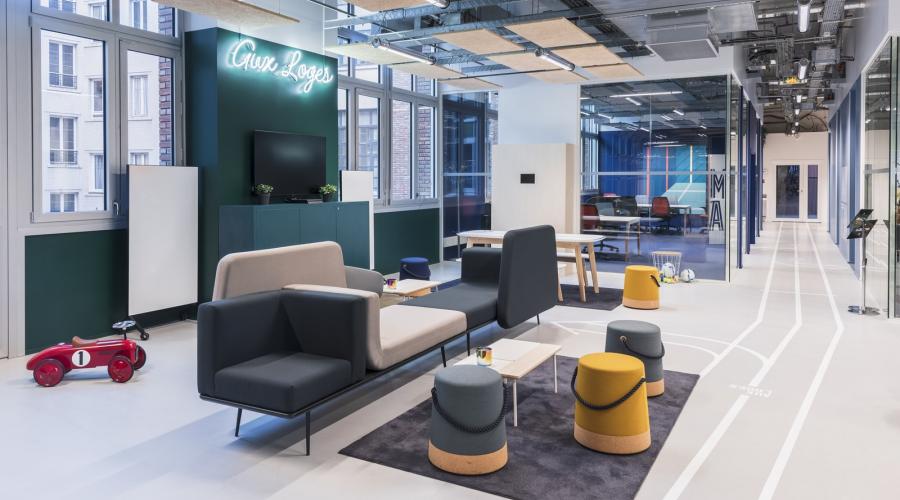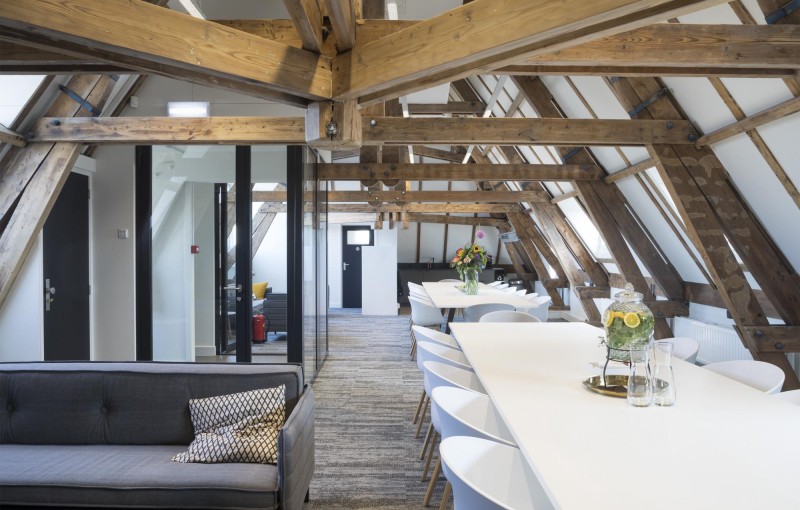
Serviced office vs. Conventional office, what is the most cost-effective option?
✔Last updated: November 2025, by Jeroen van der Linde

The property market is undergoing a structural transformation. With the structural breakthrough of hybrid working models, the traditional function of the office as a fixed workplace has evolved into a strategic meeting and collaboration hub.
This is forcing organisations to reassess their capital allocation. The crucial question for today's decision-makers is: What is the actual Total Cost of Ownership (TCO) of our real estate strategy at an average occupancy rate of 40-60%?
This article analyses the financial and operational implications of full-service (flexible) versus conventional office space and identifies the most cost-effective solution for the modern, agile enterprise.
Rent office space with Flexas.com
Understanding the difference between full-service and conventional office spaces
Definition and context
- Full-service offices (Managed/Flexible offices): Fully operational spaces, provided at all-inclusive rates and flexible, short-term contracts.
- Conventional offices: Shell-finished spaces; require multi-year leases (typically 5+ years), with the tenant being fully responsible for fit-out, management and maintenance.
6 elements to consider when choosing office space
1. Flexibility of the agreement
Full-service office spaces offer many different advantages. First and foremost, tenants are not bound by a long-term contract, which gives them the option to leave. This allows companies to see whether the space is suitable for their needs. On the other hand, conventional office spaces are more suitable for established companies with clearly defined needs that are looking for a long-term office solution. However, given the unpredictability and uncertainty associated with setting up a new business, monthly contracts can be highly valued by new ventures and start-ups. After all, the latter offer sufficient flexibility to companies that cannot take the risk of entering into a three- or nine-year contract without knowing whether they will be profitable. Monthly contracts with flexible terms are therefore generally better suited to small or young companies.
| Aspect | Conventional office | Full-service office | Strategic implication |
|---|---|---|---|
| Lease term | Typically 5+ years | Short-term and flexible | Risk reduction: Full-service models limit exposure to long-term void costs during restructuring or downsizing. |
| Adaptability | Slow and costly (requires renegotiation and refurbishment) | Fast – by simply adjusting the number of desks or memberships | Agility: Ideal for organisations experiencing fluctuating growth. |
2. Capital expenditure (CAPEX) and operational efficiency
Conventional leases require significant upfront investment in fit-out, furniture, technology, and infrastructure. These Capital Expenditures (CAPEX) tie up valuable liquidity that could otherwise be used for core operations or innovation. By shifting these fixed costs into predictable monthly Operational Expenditures (OPEX), full-service workspaces help strengthen cash flow and improve financial flexibility.
| Aspect | Conventional office | Full-service office | Financial impact |
|---|---|---|---|
| Initial investment | High (CAPEX) | Low or none (OPEX) | Capital efficiency: Frees up working capital for growth and innovation instead of long-term asset depreciation. |
| Fit-out and IT | Tenant-managed; high total cost of ownership | Fully equipped and ready for immediate use | Speed to market: Move in and operate instantly without the delays of build-out and procurement. |
3. Total Cost of Ownership (TCO) and budget predictability
The Total Cost of Ownership includes much more than rent—it covers service charges, utilities, maintenance, cleaning, and management costs. In conventional leases, these variable costs can fluctuate unpredictably. In contrast, full-service offices use a transparent, all-inclusive pricing model, providing stable monthly expenses that enable accurate budgeting and stronger financial control.
| Aspect | Conventional office | Full-service office | Predictability |
|---|---|---|---|
| Cost structure | Variable and prone to unexpected charges | Fixed, all-inclusive rate | Budget certainty: Enables accurate long-term financial planning. |
| Management burden | Handled internally by the tenant | Fully managed by the workspace provider | Operational efficiency: Reduces internal admin and management overheads. |
4. Space efficiency and occupancy
Hybrid working has transformed how office space is used. Traditional offices now experience much lower occupancy levels, leading to costly underutilisation. At the same time, the need has shifted from individual desks towards collaborative zones, quiet areas, and meeting rooms. Full-service offices are designed to support these modern work patterns and can be reconfigured quickly to match changing needs. Cost-effectiveness is best assessed on a per-active-employee basis rather than per square foot. Flexible workspaces are advantageous here, as businesses only pay for what they use, while providers can optimise layouts efficiently at scale.
| Aspect | Conventional office | Full-service office | Efficiency metric |
|---|---|---|---|
| Space usage | Rent all square footage, regardless of occupancy | Pay per desk or per required workspace | Efficiency: Avoids paying for unused space and improves utilisation rates. |
| Adaptability | Expensive and time-consuming fit-out changes | Quick, provider-managed reconfiguration | Optimisation: Rapidly align the workspace with evolving team needs. |
5. Employee experience and talent retention
The modern office must deliver more value than working from home. Workplace design and amenities directly influence employee satisfaction and play a major role in attracting and retaining talent. Full-service offices typically provide access to high-quality shared facilities such as lounges, cafés, meeting rooms, and wellness areas—benefits that are difficult for individual tenants to replicate cost-effectively. By outsourcing operational services like reception, cleaning, and IT support, companies can let their teams focus on core business activities and innovation.
| Aspect | Conventional office | Full-service office | Competitive advantage |
|---|---|---|---|
| Facilities quality | Dependent on tenant’s investment | Access to premium shared amenities | Talent attraction: Offers a superior working environment at a predictable cost. |
| Services | Self-managed (security, reception, cleaning) | Professional on-site management and services included | Business focus: Teams can concentrate fully on strategic goals. |
6. Location strategy and distributed operations
Location strategies have evolved from single headquarters to multi-site networks. With full-service providers, organisations can easily adopt a ‘Hub & Spoke’ model—maintaining a central hub while opening regional spokes closer to employees. This approach reduces commuting time and travel costs, supports employee wellbeing, and aligns with sustainability and ESG goals by cutting carbon emissions from travel.
| Aspect | Conventional office | Full-service office | Strategic outcome |
|---|---|---|---|
| Location model | Single centralised headquarters | Decentralised network (Hub & Spoke) | Reach: Expands access to talent and improves employee accessibility. |
| Sustainability (ESG) | Self-managed energy and certifications | Shared infrastructure and efficient energy management | Compliance: Supports ESG commitments and carbon reduction targets. |
Conclusion: The financially strategic choice
The most cost-effective office solution is no longer determined by the lowest rent but by the balance between financial risk, operational flexibility, and employee value.
Full-service and managed offices are typically the most cost-efficient choice for SMEs and organisations with uncertain or fluctuating growth. Eliminating CAPEX, achieving predictable TCO, and reducing risk through flexible terms more than offset the higher cost per square foot. Conventional offices remain most suitable for large, stable enterprises that can maintain consistently high occupancy levels (>80%) over the long term.
Looking to optimise your office strategy?
The best solution depends on your organisation’s size, stability, and growth objectives. Flexas.com is your independent partner, offering transparent comparisons of premium full-service offices and strategically located conventional workspaces across the UK and Europe.
Contact one of our office specialists today to find the most cost-effective and future-proof workspace for your business.


